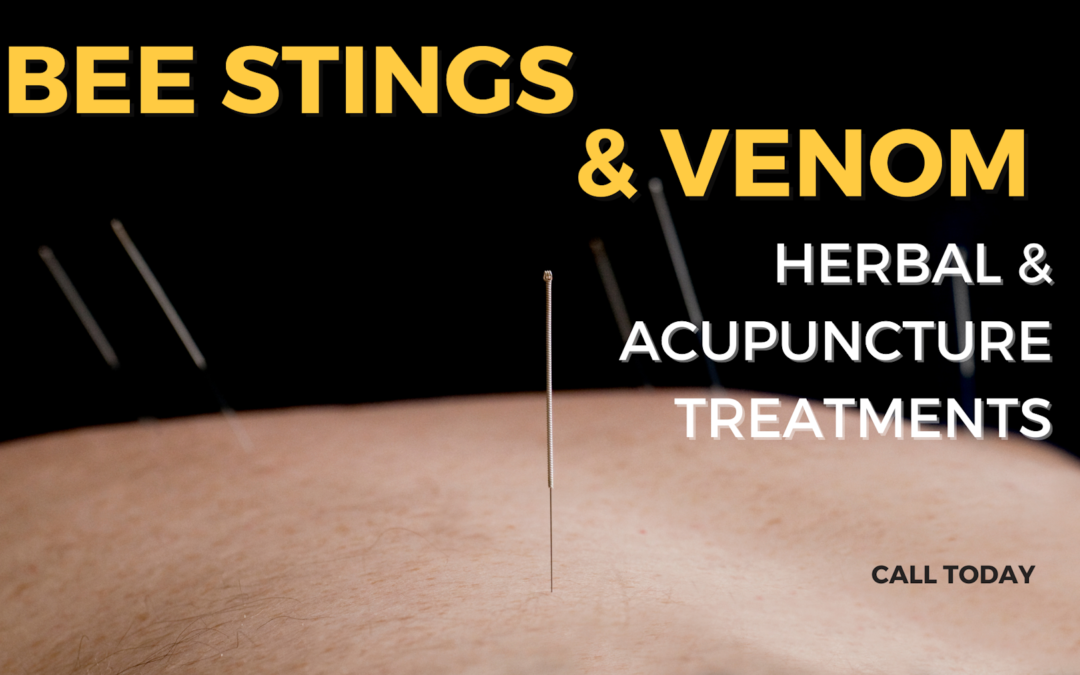Imagine a sunny Sarasota day spent in your garden, surrounded by blooming flowers and the gentle hum of bees. While these buzzing insects play a vital role in pollination, they also pose a potential threat: bee stings. For some, a bee sting may lead to pain, swelling, and discomfort, while others may experience severe allergic reactions. In Sarasota, Florida, Metta Acupuncture & Herbal Medicine offers a holistic approach to bee sting treatment, utilizing the healing properties of herbal medicine to alleviate discomfort and promote recovery naturally. Let’s explore how herbal medicine can be used effectively to treat bee stings and manage bee sting allergies.
Understanding Bee Stings and Allergies and dealing with it
Before diving into the world of herbal remedies, it’s crucial to understand the mechanisms behind bee stings and bee sting allergies. When a bee stings, it injects venom into the skin, which contains a mixture of toxic proteins that can trigger various reactions in the body. Most people experience localized pain, swelling, and redness at the site of the sting. These symptoms typically resolve on their own within a few hours or days.
However, some individuals are allergic to bee stings, and their immune systems overreact to the venom. This can result in severe symptoms, including:
1. Difficulty breathing
2. Swelling beyond the sting site
3. Hives and itching
4. Rapid heartbeat
5. Nausea and vomiting
6. Loss of consciousness
Anaphylaxis, a potentially life-threatening allergic reaction, requires immediate medical attention, including the use of epinephrine (EpiPen) and a visit to the emergency room. Those who have a known bee sting allergy should always carry an EpiPen and seek guidance from an allergist.
Herbal Medicine for Bee Sting Relief
For non-allergic individuals and mild bee sting cases, herbal medicine can be an excellent option to ease discomfort and promote healing. Metta Acupuncture & Herbal Medicine in Sarasota, FL, offers a range of natural remedies to alleviate the pain and swelling associated with bee stings:
1. Aloe Vera: Aloe vera is renowned for its soothing properties. Applying aloe vera gel to the sting site can help reduce pain, inflammation, and redness. It also accelerates the healing process.
2. Calendula: Calendula, commonly known as marigold, has anti-inflammatory and antiseptic properties. Calendula ointment or cream can be applied topically to the bee sting area to relieve pain and reduce swelling.
3. Lavender Essential Oil: Lavender essential oil is a versatile remedy for various skin issues. Its analgesic and anti-inflammatory properties make it an excellent choice for soothing bee stings. Dilute a few drops of lavender oil with a carrier oil and gently apply to the affected area.
4. Chamomile: Chamomile tea bags can be used as a compress on the bee sting site. Chamomile’s anti-inflammatory properties help alleviate pain and redness. Brew a strong chamomile tea, let it cool, and place the tea bag on the affected area for 10-15 minutes.
5. Plantain Leaf: Plantain leaves, often found in your backyard, have natural anti-itch and anti-inflammatory properties. Crush a fresh leaf and apply it directly to the bee sting for relief.
6. Arnica: Arnica gel or cream is well-known for its pain-relieving properties. It can reduce swelling and bruising associated with bee stings when applied topically.
7. Witch Hazel: Witch hazel is an astringent that can help reduce swelling and pain. Apply it to the bee sting area using a cotton ball.
These herbal remedies, offered at Metta Acupuncture & Herbal Medicine, can significantly improve your bee sting experience. Dr. Hsin Hsin Hu is very effective in the treatment of bee stings with herbal treatments. She is also an expert in the providing restored comfort with bee venom in the use of acupuncture. However, if you experience any severe allergic symptoms or have a known allergy, seek immediate medical attention.
Preventing Bee Sting Allergies
Prevention is always the best medicine when it comes to bee sting allergies. Here are some practical tips to reduce your risk:
1. Avoid Provoking Bees: Be mindful of your actions when outdoors. Avoid swatting at bees or disturbing their hives, as this can lead to stings.
2. Wear Protective Clothing: When spending time in areas where bees are prevalent, consider wearing long sleeves, pants, and closed-toe shoes. Bright colors and floral patterns may attract bees, so opt for neutral clothing.
3. Use Bee Repellents: Natural repellents such as citronella or eucalyptus oil can deter bees. Apply them to your clothing or use citronella candles when outdoors.
4. Stay Calm: If a bee approaches, remain calm and still. Sudden movements can provoke them. Slowly move away from the bee.
5. Educate Yourself: If you have a known bee sting allergy, educate yourself and your loved ones about the signs and symptoms of anaphylaxis and the proper use of an EpiPen.
While bee stings can be painful and even life-threatening for those with allergies, the healing power of herbal medicine offers a natural and effective way to alleviate discomfort and promote recovery. Metta Acupuncture & Herbal Medicine in Sarasota provides a range of herbal remedies to ease the pain and swelling associated with bee stings. However, it’s crucial to differentiate between mild reactions and severe allergies, as the latter requires immediate medical attention. By taking precautions to prevent bee stings and being prepared, you can enjoy the beauty of nature while staying safe and healthy. If you ever find yourself in need of bee sting treatment, Sarasota’s Metta Acupuncture & Herbal Medicine is here to help you harness the healing potential of herbal medicine for a more comfortable and natural recovery. Call today for an appointment at 941-587-6311


Recent Comments